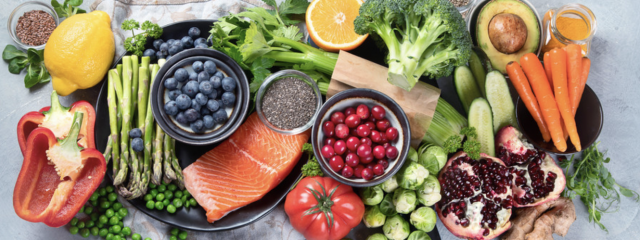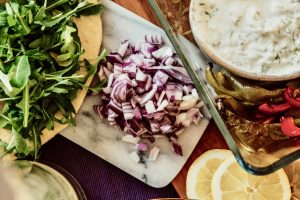Nutritionally Support A Stoma

Registered Clinical Dietitian
What is a Stoma?
On average in the UK, more than 21,000 people have surgery to create a stoma annually and it is estimated that as many as 1 in every 500 people in the UK currently live with a stoma. The creation of a stoma involves surgically bringing part of the bowel through the abdominal wall and stitching it place on the abdomen.
Stoma’s can be both temporary and permanent and can be required due to a number of different health conditions, with the most common being as a result of Inflammatory Bowel Disease, Cancer or accidental injury such as a trauma to the bowel. The two types of stoma related to bowel surgery are a colostomy and an ileostomy. A colostomy involves part of the colon being brought through the abdomen, and an ileostomy involves part of the small intestine being externally stitched to the abdomen.
Stoma surgery is invasive and traumatic both psychologically and physiologically and therefore adequate dietary support is vital in both recovery and rehabilitation. Yet despite the high numbers of people currently living with an ileostomy, recent evidence suggests that almost one-third of patients never received dietary advice for their ileostomy. This has been shown to directly correspond to feelings of anxiety, as well as confusion and frustration, regarding the diet to follow with a new ileostomy.
Recent evidence suggests that almost one-third of patients never received dietary advice for their ileostomy.
Often people are given advice during a hospital stay related to the formation of a new ileostomy, however this is often not reviewed on discharge leaving many people with a new ileostomy feeling confused over conflicting dietary advice that often centres around avoiding certain fruit and vegetables and remaining on a diet high in starchy white carbohydrate foods. Due to the fear of complications and lack of dietary follow up, many people often remain on diets which are not nutritionally complete and can then present to medical teams at a later date with nutritional deficiencies.
Nutrition for a stoma
So, what does the diet with an ileostomy actually look like? Eating again after an ileostomy should be focussed around getting enough nutrition in, but also allowing the bowel to adapt to a new way of functioning and therefore the diet should be built up gradually. It can take a few days for the bowel to start working for output to go into the bag, and the body needs to adapt to no longer having a colon. It is vital that the diet that is followed in the initial weeks after surgery, is not a long-term diet as this can lead to lack of macro and micronutrients.
Diet initially after having a stoma:
- The output can initially be watery as the colon is no longer present to absorb water and electrolytes and it can take a few months for the bowel to slowly adapt to reabsorb the water and salts. For the first few months, it is important to increase the salt intake slightly to combat losses from the stoma
- Drink plenty of fluids to combat water losses and if the output remains very watery, opt for rehydration solution such as Diiorylte rather than plain water as this can lead to people becoming more dehydrated.
- Opt for ‘bland’, low fibre foods which are easy for the body to digest such as Rice Crispies, soft ripe bananas, crackers and mashed potato
- Eat small portions regularly through the day as leaving big gaps between meals will increase the stoma action after eating
- Avoid drinking before or during the meal as if your appetite is poor after surgery, fluid will fill you up too much and stop you from being able to take in enough nutrition
- Bowel surgery is invasive and therefore increases the body’s nutritional requirements. Try to increase the protein intake to help with wound healing. Milky drinks and yogurts are a great way to help boost the protein intake as well as providing calories and calcium.
- Avoid pips, piths and skins are these can cause blockages in the early stages after an ileostomy
- Gradually reintroduce higher fibre foods one at a time and monitor tolerance. If something doesn’t agree with you, give it a few weeks and try that food again. It may be the bowel just needs time to adapt post-surgery and isn’t quite ready for that food
- Experiment with new foods when you are at home and feel comfortable to help get your confidence back
- Certain foods may increase wind, or cause odour. That doesn’t mean they will do any harm and should be avoided, it may be you will just feel more comfortable only having these when you are at home with your own bathroom. Remember, stoma bags are well sealed and do not smell until emptied, so nobody else will notice any odour!

A few months after surgery:
- There is nothing on paper that people can’t eat after a few months post ileostomy surgery, however it is vital to eat slowly and chew your food very well to avoid blockages. Try putting your knife and fork down between each mouthful to encourage slow eating.
- Try to maintain a healthy weight for overall health and to minimise issues with the stoma bag sticking
- Only have spicy foods, high fat foods, alcohol and fruit juice in moderation as these can cause a high stoma output which could lead to dehydration
- Try to aim for a diet with a good amount of soluble fibre, including fruit and vegetables to help increase your vitamin and mineral intake. Trying mashing vegetables or having fruit in a smoothie if you are wary about these causing a blockage.
- Only avoid foods which are your personal triggers for symptoms. Avoid cutting out food groups as this can lead to unnecessary dietary restrictions
- Aim for small, regular meals through the day to help manage the stoma output and help you to obtain maximum nutrition
- Try to include protein, vegetables and wholegrain carbohydrates at your meals to make your diet balanced
- Aim for 3 portions of calcium containing foods per day. Dairy, or dairy alternatives are good sources, as well as dried apricots and baked beans
- A varied diet is the key to maximum vitamin and mineral intake- try to ‘eat a rainbow’!
living with a stoma
A new stoma can take some adjusting to but can for many people help to improve their quality of life and allow them to eat a far more varied diet than before surgery. Remember, everyone’s gut is unique and there is no ‘one size fits all’ with gastrointestinal health and stomas, so if you are concerned about your diet or are experiencing complications, speak to registered nutrition professional.
ONLINE NUTRITIONIST COACHING
Learn more about Health and Wellbeing
Here are some articles and blogs about health and wellbeing



